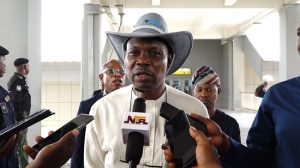Nigeria being a signatory to Convention on Biological Diversity (CBD) is ready to collaborate with all stakeholders including the youths to achieve the goals and targets of the Post 2020 Global Biodiversity Framework to regain the country’s habitat loss and fragmentation.

Dr. Iziaq Adekunle Salako, the Minister of State, Federal Ministry of Environment, made the submission on Friday, April 12, 2024, during “Media and Communication Workshop on the Implementation of the KMGBF in Nigeria” organised by the Nigeria Youth Biodiversity Network (NYBN) and Sustainable Environment Food and Agriculture Initiatives (SEFAAI) in Lagos.
Salako, who was represented by Mrs Olusola Margaret Akinyemi, the Federal Controller in Lagos, Federal Ministry of Environment, also harped on the need to address biodiversity laws that will engage all stakeholders and the local communities in various sectors. This, according to him, “is in a bid to increase the area of national ecosystems by maintaining, enhancing and restoring the integrity and resilience of all Nigerians”.
He also urged the media organisations to create more awareness in addressing the threat to biodiversity in the country.
The National Coordinator, NYBN, Olusegun Michael Ogundele, noted that the workshop is aimed at popularising the uptake and domestication of the Post 2020 GBF in Nigeria, and to increase the knowledge capacity of stakeholders, the youths and the media communities on biodiversity education and knowledge generation.
According to him, Nigerians need to know more about biodiversity conservation to address the threat of habitat loss.
Biodun Deribigbe, Director, SEFAAI, urged the government to leverage with non-governmental organisations and encourage the media in educating the people at the grassroots to understand the importance of diversity in the community.
According to him, biodiversity conservation in the country faces many challenges, such as conflicting government policies and laws, poor enforcement and compliance, inadequate capacity and data, limited public awareness and education, low stakeholder participation, and inadequate funding for advocates of biodiversity conservation.
Deribigbe noted that Nigeria needs to strengthen and expand its network of protected areas and other effective area-based conservation measures, such as community conserved areas, sacred natural sites, indigenous and local community conserved areas and private reserves, saying: “Protected areas are the cornerstone of biodiversity conservation.”
The Kunming-Montreal Global Biodiversity Framework (GBF) was adopted during the fifteenth meeting of the Conference of the Parties (COP 15) following a four-year consultation and negotiation process. The framework, which supports the achievement of the Sustainable Development Goals and builds on the Convention’s previous Strategic Plans, sets out an ambitious pathway to reach the global vision of a world living in harmony with nature by 2050. Among the Framework’s key elements are four goals for 2050 and 23 targets for 2030.
By Ajibola Adedoye
